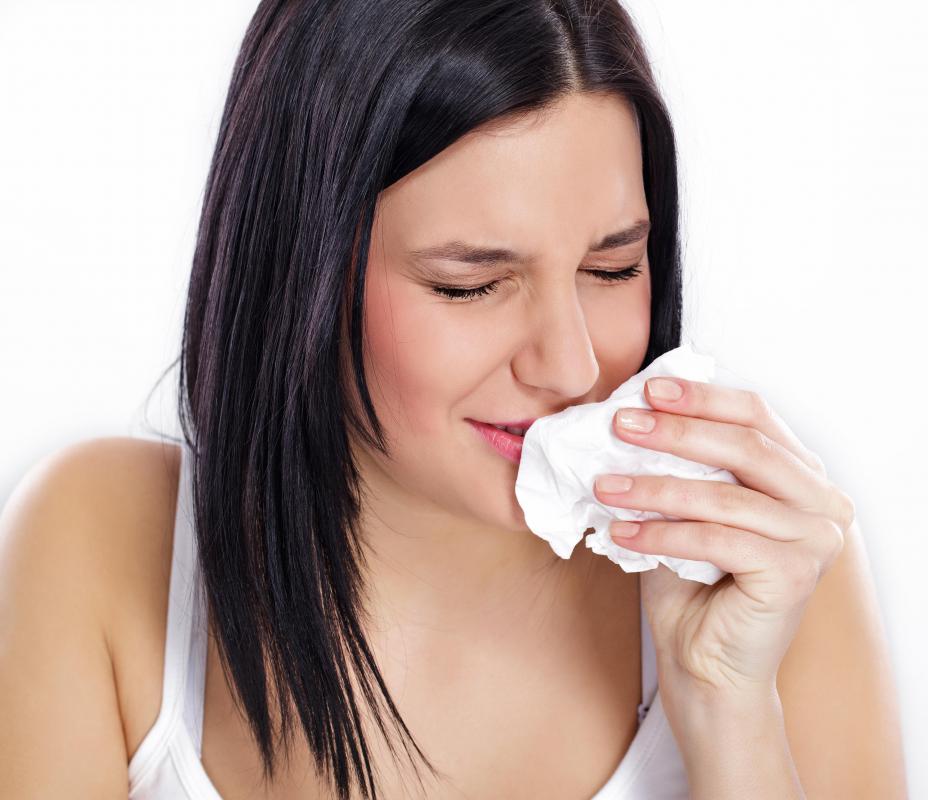At WiseGEEK, we're committed to delivering accurate, trustworthy information. Our expert-authored content is rigorously fact-checked and sourced from credible authorities. Discover how we uphold the highest standards in providing you with reliable knowledge.
How can I Diagnose a Mold Allergy?
When a person has a mold allergy, his immune system is particularly sensitive to mold spores. In fact, his immune system sees the mold spores as threats and overreacts to them by causing allergy symptoms, which may include coughing, sneezing, runny nose, and post-nasal drip. This type of allergy may also cause itchy eyes, and some people even develop itchy throats and inflammation of the sinuses.
The intensity of mold allergy symptoms varies from person to person. They may be mild, moderate, or severe. Some people notice allergy symptoms only occasionally while others suffer from allergies all year long. Those who have asthma as well as mold allergies may notice that their asthma attacks are triggered, or worsened by, mold exposure. Their allergies may lead to such symptoms as coughing and wheezing, tightness in the chest, and shortness of breath.

It is possible for a person to believe he is allergic to mold spores when he is actually having symptoms caused by an entirely different allergen. To know for sure, the person would have to visit a medical professional for a proper diagnosis. One method of diagnosing a mold allergy involves a skin prick test. For this type of test, a medical professional applies a bit of allergen that is suspected of causing the symptoms to the patient’s skin, usually on either his arm or back.

A blood test can also be used to diagnose a mold allergy. This type of blood test is referred to as the radioallergosorbent test (RAST). For this test, a medical professional draws a sample of the patient’s blood and sends it to a laboratory for testing. The medical lab checks for antibodies in the person’s blood that could indicate an allergy to mold.

If a person does have an allergy to mold, the next step is figuring out how to treat it and get relief from the uncomfortable symptoms; treatment is focused on symptom relief because there is no cure for mold allergies. Typically, medications are used to control symptoms. They include prescription nasal corticosteroids, which are nasal sprays that are said to be very effective. Antihistamines, which are taken orally, block the release of histamine; the immune system releases histamine in response to exposure to an allergen, and blocking it can provide temporary relief of symptoms. Other treatments include decongestants and over-the-counter nasal sprays; in some cases, allergy shots may be used as well.
AS FEATURED ON:
AS FEATURED ON:

















Discussion Comments
@Bakersdozen - I agree that moving to another area is a pretty major thing to do to deal with mold spore allergies. It's not an option for me but I have found other ways to help myself.
I was persuaded to try out a homeopathic practitioner and she advised me to look at my diet. These days I rarely eat butter, chocolate, nuts, sugar and general high fat foods. It's not always easy to follow this kind of eaing plan but the mold allergy relief I've experienced keeps me on it, most of the time.
This is a very scary subject and I think everyone should be aware of the symptoms of mold allergies. It's not always possible to see mold, though many people think of it only as the nasty stuff that grows on bathroom walls.
Allergy tests are a great idea if you can't see any obvious signs of mold at home. But if you do have any growing in your house or workplace please see a health professional as soon as possible.
My grandparents ignored the black mold on their basement walls, and continued to use the laundry machine as usual. They were both hospitalized with severe mold allergies as a result.
Mold allergy treatment may be about providing relief, but there are things people with this problem can do to reduce their long term sufferering.
This may sound drastic, but if you live in a rainy, damp and cloudy area you need to move! It is really difficult to ever feel properly well if you are exposed to this kind of environment.
Post your comments